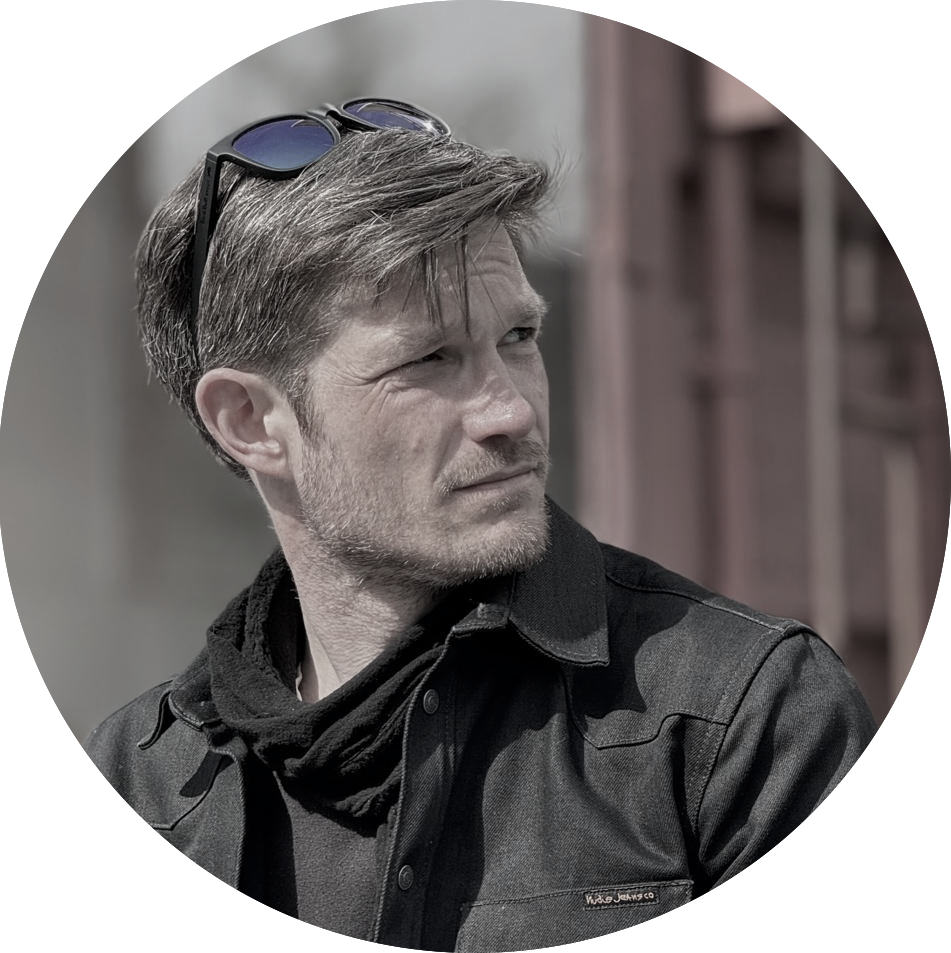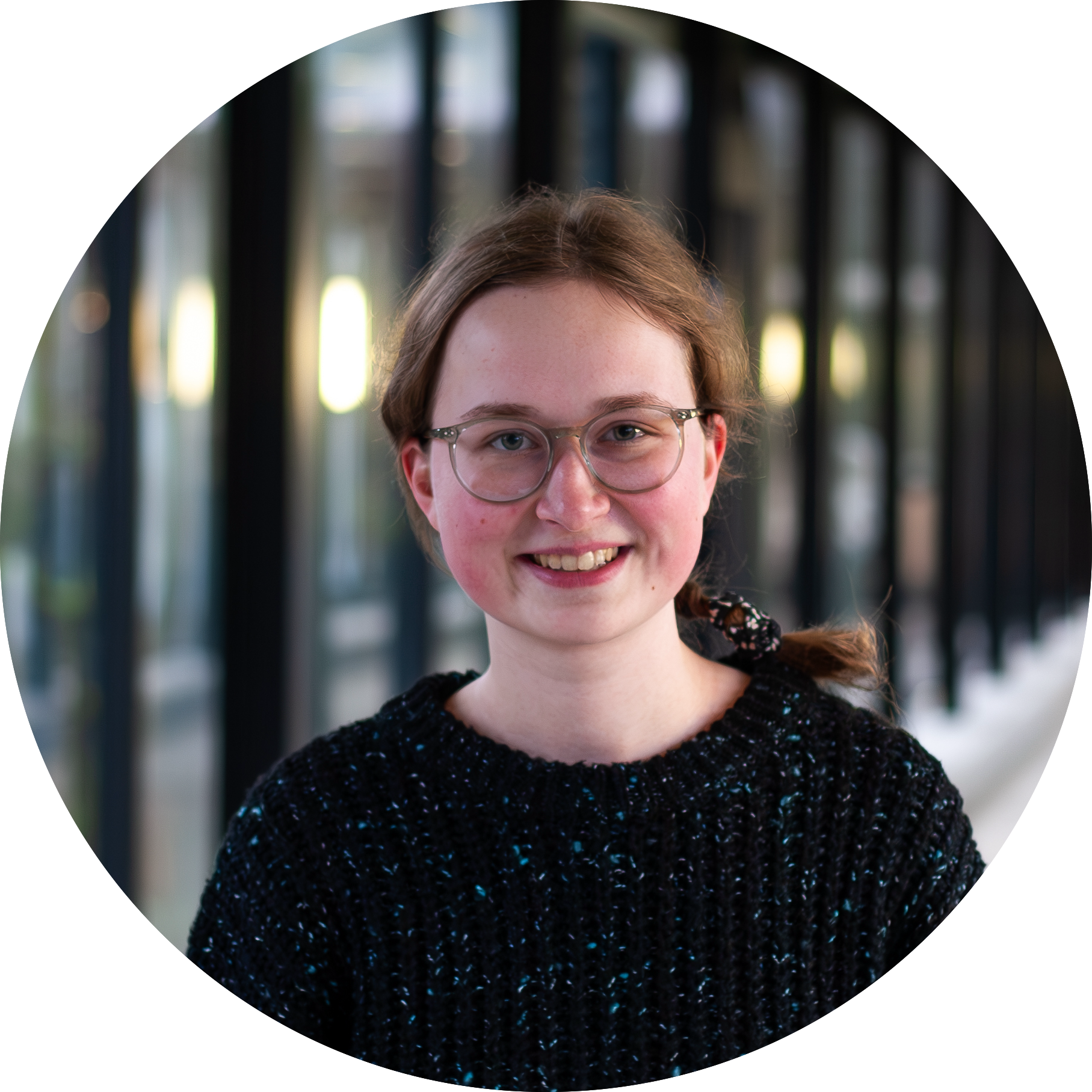People
 Michael Franke
—
Michael usually self-identifies as a computational cognitive scientist interested in higher cognition and language in particular. He has a background in cognitive science, logic and game-theory, and he's usually very happy when he can use Bayesian data analysis to fit bespoke, theoretically informed probabilistic models to empirical data.
Michael Franke
—
Michael usually self-identifies as a computational cognitive scientist interested in higher cognition and language in particular. He has a background in cognitive science, logic and game-theory, and he's usually very happy when he can use Bayesian data analysis to fit bespoke, theoretically informed probabilistic models to empirical data.
 Todd Snider
—
Todd is a postdoc in the lab, with a background in semantics and pragmatics. He's especially interested in different types of meaning (asserted, presupposed, not-at-issue, etc.) and how they interact with sentence- and discourse-level phenomena like anaphora. His favorite projects bring insights from philosophy, psychology, mathematics, and computer science into contemporary linguistic theory.
Todd Snider
—
Todd is a postdoc in the lab, with a background in semantics and pragmatics. He's especially interested in different types of meaning (asserted, presupposed, not-at-issue, etc.) and how they interact with sentence- and discourse-level phenomena like anaphora. His favorite projects bring insights from philosophy, psychology, mathematics, and computer science into contemporary linguistic theory.
 Andreas Waldis
—
Andreas is a postdoc in the lab. He has a background in natural language processing with a focus on the evaluation, interpretability, and generalizability of language models. He loves conducting extensive experiments to examine behavioral and internal perspectives on language models and to connect insights to linguistic or cognitive theories, thereby gaining a comprehensive understanding of these models and their societal role.
Andreas Waldis
—
Andreas is a postdoc in the lab. He has a background in natural language processing with a focus on the evaluation, interpretability, and generalizability of language models. He loves conducting extensive experiments to examine behavioral and internal perspectives on language models and to connect insights to linguistic or cognitive theories, thereby gaining a comprehensive understanding of these models and their societal role.
 Ananya Albrecht-Buehler
—
Ananya is a first-year PhD student in the A7 project within the CRC 1718 Common Ground. Her research draws on a background in Experimental Psychology and Quantitative Data Science Methods to investigate the communicative (and potentially linguistic) abilities of non-humans.
Ananya Albrecht-Buehler
—
Ananya is a first-year PhD student in the A7 project within the CRC 1718 Common Ground. Her research draws on a background in Experimental Psychology and Quantitative Data Science Methods to investigate the communicative (and potentially linguistic) abilities of non-humans.
 Nadine Balbach
—
Apart from coordinating a DFG center, Nadine is also a PhD student working in the field of experimental pragmatics. Her research focuses on the inferences triggered by exceptives. She investigates this topic by examining not only the developmental trajectory of exceptives and its associated inferences, but also their status and the processing costs involved in accommodating non-saturated or falsified inferences more generally. To this end, she conducts self-paced reading experiments, picture verification tasks, and corpus linguistic analyses.
Nadine Balbach
—
Apart from coordinating a DFG center, Nadine is also a PhD student working in the field of experimental pragmatics. Her research focuses on the inferences triggered by exceptives. She investigates this topic by examining not only the developmental trajectory of exceptives and its associated inferences, but also their status and the processing costs involved in accommodating non-saturated or falsified inferences more generally. To this end, she conducts self-paced reading experiments, picture verification tasks, and corpus linguistic analyses.
 Eline Ensinck
—
Eline is doing a PhD on the semantics and pragmatics of LLMs in the philosophy of language group at Radboud university in Nijmegen (the Netherlands). Michael Franke is her third supervisor and in this way she is also linked to the CSP lab. Besides looking at questions such as what LLMs may “understand”, she is very much interested in the interaction between humans and LLMs and how e.g. humanlike descriptions of these models influence our interpretation of them.
Eline Ensinck
—
Eline is doing a PhD on the semantics and pragmatics of LLMs in the philosophy of language group at Radboud university in Nijmegen (the Netherlands). Michael Franke is her third supervisor and in this way she is also linked to the CSP lab. Besides looking at questions such as what LLMs may “understand”, she is very much interested in the interaction between humans and LLMs and how e.g. humanlike descriptions of these models influence our interpretation of them.
 Ari Joshi
—
Ari is a PhD student, based at ZAS Berlin. She's broadly interested in how we modulate and coordinate on meaning components that are shared 'between the lines'. In her doctoral project, she is approaching this through the lens of so-called metalinguistic operators, like the negation in "Mary didn't *stop* smoking, since she never started". She also enjoys thinking about the depth-charge illusion, assorted curiosities from Marathi, and the probabilisticness of apparently everything. At the moment, her preferred tools are mostly formal and experimental.
Ari Joshi
—
Ari is a PhD student, based at ZAS Berlin. She's broadly interested in how we modulate and coordinate on meaning components that are shared 'between the lines'. In her doctoral project, she is approaching this through the lens of so-called metalinguistic operators, like the negation in "Mary didn't *stop* smoking, since she never started". She also enjoys thinking about the depth-charge illusion, assorted curiosities from Marathi, and the probabilisticness of apparently everything. At the moment, her preferred tools are mostly formal and experimental.
 Jan-Felix Klumpp
—
Jan-Felix is a first-year PhD student in General / Computational Linguistics. He is particularly interested in the pragmatic behaviour of modern Large Language Models, in using them to model more complex reasoning processes, and more generally in the implications of these models for linguistic research.
Jan-Felix Klumpp
—
Jan-Felix is a first-year PhD student in General / Computational Linguistics. He is particularly interested in the pragmatic behaviour of modern Large Language Models, in using them to model more complex reasoning processes, and more generally in the implications of these models for linguistic research.
 Amir Mohammadpour
—
Amir is a first-year PhD student with a background in computational linguistics and natural language processing. His research interests cover the mechanistic interpretability of transformers and the expressiveness thereof, in concert with the application of these methods to deepen our understanding of machine learnability and, potentially, cognition.
Amir Mohammadpour
—
Amir is a first-year PhD student with a background in computational linguistics and natural language processing. His research interests cover the mechanistic interpretability of transformers and the expressiveness thereof, in concert with the application of these methods to deepen our understanding of machine learnability and, potentially, cognition.
 Amelie Rüeck
—
Amelie is a first year PhD student in General Linguistics, as part of project A1 of the CRC 1718 on Common Ground. With a background in syntax, pragmatics, and computational linguistics, she is mainly interested in probabilistic reasoning about Common Ground, particularly within the Rational Speech Act framework. She is also interested in the syntax-pragmatics interface and in uncooperative communication.
Amelie Rüeck
—
Amelie is a first year PhD student in General Linguistics, as part of project A1 of the CRC 1718 on Common Ground. With a background in syntax, pragmatics, and computational linguistics, she is mainly interested in probabilistic reasoning about Common Ground, particularly within the Rational Speech Act framework. She is also interested in the syntax-pragmatics interface and in uncooperative communication.
 Polina Tsvilodub
—
Polina is a senior PhD student. She has a cognitive science background, and is excited about understanding pragmatic, goal-directed language generation and interpretation, both in humans and machines. Her work uses a combination of human experimental research, LLM studies, and strives to develop frameworks for combining computational cognitive models and LLM modules for explaining more open-ended pragmatic language use.
Polina Tsvilodub
—
Polina is a senior PhD student. She has a cognitive science background, and is excited about understanding pragmatic, goal-directed language generation and interpretation, both in humans and machines. Her work uses a combination of human experimental research, LLM studies, and strives to develop frameworks for combining computational cognitive models and LLM modules for explaining more open-ended pragmatic language use.
 Hening Wang
—
Hening is a PhD student with a background in Psycholinguistics, Semantics and Pragmatics. He is affiliated with the Linguistic Meaning and Bayesian Modeling (LMBayes) project at the Leibniz-Centre General Linguistics (ZAS), part of the Leibniz Association Link . His research focuses on understanding pragmatics in causal communication, combining experimental and computational approaches. Outside of research, he enjoys snowboarding and motorbiking — but strongly dislikes .DS_Store.
Hening Wang
—
Hening is a PhD student with a background in Psycholinguistics, Semantics and Pragmatics. He is affiliated with the Linguistic Meaning and Bayesian Modeling (LMBayes) project at the Leibniz-Centre General Linguistics (ZAS), part of the Leibniz Association Link . His research focuses on understanding pragmatics in causal communication, combining experimental and computational approaches. Outside of research, he enjoys snowboarding and motorbiking — but strongly dislikes .DS_Store.
 Erik Zeiner
—
Erik is a first-year PhD student in the Tübingen–Edinburgh collaborative project Communicating Causality. He has a background in computational linguistics, and his research focuses on using tools from formal and experimental pragmatics to bridge philosophical theories and computational models of causal cognition.
Erik Zeiner
—
Erik is a first-year PhD student in the Tübingen–Edinburgh collaborative project Communicating Causality. He has a background in computational linguistics, and his research focuses on using tools from formal and experimental pragmatics to bridge philosophical theories and computational models of causal cognition.
 Michael Franke
—
Michael usually self-identifies as a computational cognitive scientist interested in higher cognition and language in particular. He has a background in cognitive science, logic and game-theory, and he's usually very happy when he can use Bayesian data analysis to fit bespoke, theoretically informed probabilistic models to empirical data.
Michael Franke
—
Michael usually self-identifies as a computational cognitive scientist interested in higher cognition and language in particular. He has a background in cognitive science, logic and game-theory, and he's usually very happy when he can use Bayesian data analysis to fit bespoke, theoretically informed probabilistic models to empirical data.
 Todd Snider
—
Todd is a postdoc in the lab, with a background in semantics and pragmatics. He's especially interested in different types of meaning (asserted, presupposed, not-at-issue, etc.) and how they interact with sentence- and discourse-level phenomena like anaphora. His favorite projects bring insights from philosophy, psychology, mathematics, and computer science into contemporary linguistic theory.
Todd Snider
—
Todd is a postdoc in the lab, with a background in semantics and pragmatics. He's especially interested in different types of meaning (asserted, presupposed, not-at-issue, etc.) and how they interact with sentence- and discourse-level phenomena like anaphora. His favorite projects bring insights from philosophy, psychology, mathematics, and computer science into contemporary linguistic theory.
 Andreas Waldis
—
Andreas is a postdoc in the lab. He has a background in natural language processing with a focus on the evaluation, interpretability, and generalizability of language models. He loves conducting extensive experiments to examine behavioral and internal perspectives on language models and to connect insights to linguistic or cognitive theories, thereby gaining a comprehensive understanding of these models and their societal role.
Andreas Waldis
—
Andreas is a postdoc in the lab. He has a background in natural language processing with a focus on the evaluation, interpretability, and generalizability of language models. He loves conducting extensive experiments to examine behavioral and internal perspectives on language models and to connect insights to linguistic or cognitive theories, thereby gaining a comprehensive understanding of these models and their societal role.
 Ananya Albrecht-Buehler
—
Ananya is a first-year PhD student in the A7 project within the CRC 1718 Common Ground. Her research draws on a background in Experimental Psychology and Quantitative Data Science Methods to investigate the communicative (and potentially linguistic) abilities of non-humans.
Ananya Albrecht-Buehler
—
Ananya is a first-year PhD student in the A7 project within the CRC 1718 Common Ground. Her research draws on a background in Experimental Psychology and Quantitative Data Science Methods to investigate the communicative (and potentially linguistic) abilities of non-humans.
 Nadine Balbach
—
Apart from coordinating a DFG center, Nadine is also a PhD student working in the field of experimental pragmatics. Her research focuses on the inferences triggered by exceptives. She investigates this topic by examining not only the developmental trajectory of exceptives and its associated inferences, but also their status and the processing costs involved in accommodating non-saturated or falsified inferences more generally. To this end, she conducts self-paced reading experiments, picture verification tasks, and corpus linguistic analyses.
Nadine Balbach
—
Apart from coordinating a DFG center, Nadine is also a PhD student working in the field of experimental pragmatics. Her research focuses on the inferences triggered by exceptives. She investigates this topic by examining not only the developmental trajectory of exceptives and its associated inferences, but also their status and the processing costs involved in accommodating non-saturated or falsified inferences more generally. To this end, she conducts self-paced reading experiments, picture verification tasks, and corpus linguistic analyses.
 Eline Ensinck
—
Eline is doing a PhD on the semantics and pragmatics of LLMs in the philosophy of language group at Radboud university in Nijmegen (the Netherlands). Michael Franke is her third supervisor and in this way she is also linked to the CSP lab. Besides looking at questions such as what LLMs may “understand”, she is very much interested in the interaction between humans and LLMs and how e.g. humanlike descriptions of these models influence our interpretation of them.
Eline Ensinck
—
Eline is doing a PhD on the semantics and pragmatics of LLMs in the philosophy of language group at Radboud university in Nijmegen (the Netherlands). Michael Franke is her third supervisor and in this way she is also linked to the CSP lab. Besides looking at questions such as what LLMs may “understand”, she is very much interested in the interaction between humans and LLMs and how e.g. humanlike descriptions of these models influence our interpretation of them.
 Ari Joshi
—
Ari is a PhD student, based at ZAS Berlin. She's broadly interested in how we modulate and coordinate on meaning components that are shared 'between the lines'. In her doctoral project, she is approaching this through the lens of so-called metalinguistic operators, like the negation in "Mary didn't *stop* smoking, since she never started". She also enjoys thinking about the depth-charge illusion, assorted curiosities from Marathi, and the probabilisticness of apparently everything. At the moment, her preferred tools are mostly formal and experimental.
Ari Joshi
—
Ari is a PhD student, based at ZAS Berlin. She's broadly interested in how we modulate and coordinate on meaning components that are shared 'between the lines'. In her doctoral project, she is approaching this through the lens of so-called metalinguistic operators, like the negation in "Mary didn't *stop* smoking, since she never started". She also enjoys thinking about the depth-charge illusion, assorted curiosities from Marathi, and the probabilisticness of apparently everything. At the moment, her preferred tools are mostly formal and experimental.
 Jan-Felix Klumpp
—
Jan-Felix is a first-year PhD student in General / Computational Linguistics. He is particularly interested in the pragmatic behaviour of modern Large Language Models, in using them to model more complex reasoning processes, and more generally in the implications of these models for linguistic research.
Jan-Felix Klumpp
—
Jan-Felix is a first-year PhD student in General / Computational Linguistics. He is particularly interested in the pragmatic behaviour of modern Large Language Models, in using them to model more complex reasoning processes, and more generally in the implications of these models for linguistic research.
 Amir Mohammadpour
—
Amir is a first-year PhD student with a background in computational linguistics and natural language processing. His research interests cover the mechanistic interpretability of transformers and the expressiveness thereof, in concert with the application of these methods to deepen our understanding of machine learnability and, potentially, cognition.
Amir Mohammadpour
—
Amir is a first-year PhD student with a background in computational linguistics and natural language processing. His research interests cover the mechanistic interpretability of transformers and the expressiveness thereof, in concert with the application of these methods to deepen our understanding of machine learnability and, potentially, cognition.
 Amelie Rüeck
—
Amelie is a first year PhD student in General Linguistics, as part of project A1 of the CRC 1718 on Common Ground. With a background in syntax, pragmatics, and computational linguistics, she is mainly interested in probabilistic reasoning about Common Ground, particularly within the Rational Speech Act framework. She is also interested in the syntax-pragmatics interface and in uncooperative communication.
Amelie Rüeck
—
Amelie is a first year PhD student in General Linguistics, as part of project A1 of the CRC 1718 on Common Ground. With a background in syntax, pragmatics, and computational linguistics, she is mainly interested in probabilistic reasoning about Common Ground, particularly within the Rational Speech Act framework. She is also interested in the syntax-pragmatics interface and in uncooperative communication.
 Polina Tsvilodub
—
Polina is a senior PhD student. She has a cognitive science background, and is excited about understanding pragmatic, goal-directed language generation and interpretation, both in humans and machines. Her work uses a combination of human experimental research, LLM studies, and strives to develop frameworks for combining computational cognitive models and LLM modules for explaining more open-ended pragmatic language use.
Polina Tsvilodub
—
Polina is a senior PhD student. She has a cognitive science background, and is excited about understanding pragmatic, goal-directed language generation and interpretation, both in humans and machines. Her work uses a combination of human experimental research, LLM studies, and strives to develop frameworks for combining computational cognitive models and LLM modules for explaining more open-ended pragmatic language use.
 Erik Zeiner
—
Erik is a first-year PhD student in the Tübingen–Edinburgh collaborative project Communicating Causality. He has a background in computational linguistics, and his research focuses on using tools from formal and experimental pragmatics to bridge philosophical theories and computational models of causal cognition.
Erik Zeiner
—
Erik is a first-year PhD student in the Tübingen–Edinburgh collaborative project Communicating Causality. He has a background in computational linguistics, and his research focuses on using tools from formal and experimental pragmatics to bridge philosophical theories and computational models of causal cognition.
